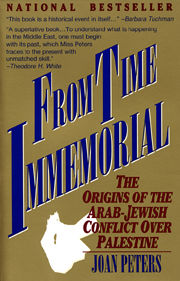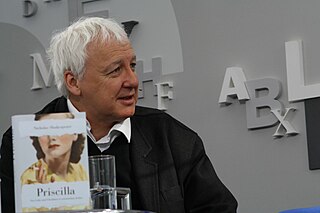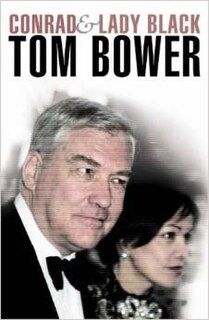
Patrick O'Brian, CBE, born Richard Patrick Russ, was an English novelist and translator, best known for his Aubrey–Maturin series of sea novels set in the Royal Navy during the Napoleonic Wars, and centred on the friendship of the English naval captain Jack Aubrey and the Irish–Catalan physician Stephen Maturin. The 20-novel series, the first of which is Master and Commander, is known for its well-researched and highly detailed portrayal of early 19th-century life, as well as its authentic and evocative language. A partially finished 21st novel in the series was published posthumously containing facing pages of handwriting and typescript.

The Catcher in the Rye is a novel by J. D. Salinger, partially published in serial form in 1945–1946 and as a novel in 1951. It was originally intended for adults, but is often read by adolescents for its themes of angst and alienation, and as a critique on superficiality in society. It has been translated widely. Around one million copies are sold each year, with total sales of more than 65 million books. The novel's protagonist Holden Caulfield has become an icon for teenage rebellion. The novel also deals with complex issues of innocence, identity, belonging, loss, connection, sex, and depression.

From Time Immemorial: The Origins of the Arab–Jewish Conflict over Palestine is a 1984 book by Joan Peters, published by Harper & Row, about the demographics of the Arab population of Palestine and of the Jewish population of the Arab world before and after the formation of the State of Israel.

The London Review of Books (LRB) is a British literary magazine published twice monthly that features articles and essays on fiction and non-fiction subjects, which are usually structured as book reviews.
Joan Peters, later Caro, was a journalist and broadcaster. She wrote the 1984 book From Time Immemorial, a controversial account of the origins of the Palestinians.
Hugh Kingsmill Lunn, who dropped his last name for professional purposes, was a versatile British writer and journalist. Writers Arnold Lunn and Brian Lunn were his brothers.

John Henry Lanchester is a German-born British journalist and novelist. He was born in Hamburg, brought up in Hong Kong and educated in England; between 1972 and 1980 at Gresham's School in Holt, Norfolk, then at St John's College, Oxford. He is married to historian and author Miranda Carter, with whom he has two children, and lives in London.

Nicholas William Richmond Shakespeare FRSL is a British novelist and biographer, described by the Wall Street Journal as "one of the best English novelists of our time".
Thomas Michael Bower is a British writer known for his investigative journalism and for his unauthorised biographies, often of business tycoons and newspaper proprietors.

Benjamin Brian Thomas Watt is a British musician, singer, songwriter, author, DJ and radio presenter, best known as one half of the duo Everything but the Girl.

Six Days of War: June 1967 and the Making of the Modern Middle East is a 2002 non-fiction book by American-born Israeli historian and Israeli ambassador to the United States, Michael Oren, chronicling the events of the Six-Day War fought between Israel and its Arab neighbors. Widely praised by critics, the book won the Los Angeles Times Book Prize for history and spent seven weeks on the New York Times Best Seller list.

Sir Paul Collier, is a British development economist who serves as the Professor of Economics and Public Policy in the Blavatnik School of Government and the director of the International Growth Centre. He currently is a Professeur invité at Sciences Po and a Professorial Fellow of St Antony's College, Oxford. He has served as a senior advisor to the Blair Commission for Africa and was the Director of the Development Research Group at the World Bank between 1998 and 2003.

Norman Gary Finkelstein is an American political scientist, activist, professor, and author. His primary fields of research are the Israeli–Palestinian conflict and the politics of the Holocaust. He is a graduate of Binghamton University and received his Ph.D. in political science at Princeton University. He has held faculty positions at Brooklyn College, Rutgers University, Hunter College, New York University, and DePaul University, where he was an assistant professor from 2001 to 2007.

Jerome David Salinger was an American writer best known for his novel The Catcher in the Rye.
Capital (ISBN 9780571234622) is a novel by John Lanchester, published by Faber and Faber in 2012. The novel is set in London prior to and during the 2008 financial crisis, jumping between December 2007, April 2008, and August 2008. The title refers both to London as the capital city of the United Kingdom, and to financial capital. All of the main characters have a connection to Pepys Road, a street in the south London suburb of Clapham.

Conrad and Lady Black: Dancing on the Edge is a 2006 biography of the Canadian businessman and author Conrad Black and his wife, the British born Canadian journalist Barbara Amiel, by the British journalist and biographer Tom Bower.
Broken Dreams may refer to:

Stories of the Law and How It's Broken is a 2018 book by an anonymous author known as "The Secret Barrister". It is a critical first-hand account of the current state of the criminal justice system in England and Wales. The title is a play on words: the book is not about criminal lawbreaking, but about how the legal system is failing in its purpose.
Dangerous Hero: Corbyn's Ruthless Plot for Power is a 2019 biography of British Labour Party leader Jeremy Corbyn written by British conservative writer, investigative journalist and biographer Tom Bower. It is an unfriendly portrait of Corbyn.













